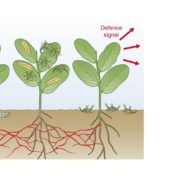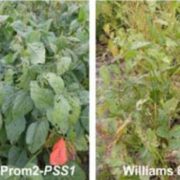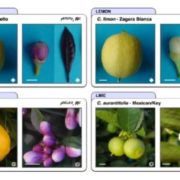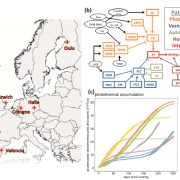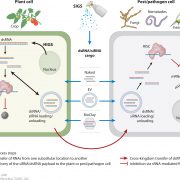Unleashing meiotic crossovers in hybrid plants ($) (PNAS)
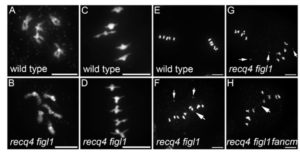 To generate new plant varieties with desirable traits, plant geneticists cross existing varieties that contain the characters they want to combine. The genetic variability is obtained thanks to events called crossovers, in which segments of homologous chromosomes are swapped during meiosis. The frequency of crossovers, however, depends on the species and is often a limiting factor in obtaining sufficient genetic variability for breeding programs. Fernandes et al. found a way to circumvent this limitation. They generated Arabidopsis mutants lacking three genes, named FANCM, RECQA/B and FIGL1. All mutants displayed higher levels of crossovers. The highest level was observed in the triple mutant (almost 8 fold more than in the wild type), thus showing that these three genes act in different cellular pathways. The triple mutant displayed a mild reduction in plant fertility and no visible phenotypic defects. Thus, the same mutations introduced in crop plants are likely to increase genetic variability without affecting other plant traits, and therefore may soon become precious tools for breeding programs. (Summary by Elisa Dell’Aglio). PNAS 10.1073/pnas.1713078114
To generate new plant varieties with desirable traits, plant geneticists cross existing varieties that contain the characters they want to combine. The genetic variability is obtained thanks to events called crossovers, in which segments of homologous chromosomes are swapped during meiosis. The frequency of crossovers, however, depends on the species and is often a limiting factor in obtaining sufficient genetic variability for breeding programs. Fernandes et al. found a way to circumvent this limitation. They generated Arabidopsis mutants lacking three genes, named FANCM, RECQA/B and FIGL1. All mutants displayed higher levels of crossovers. The highest level was observed in the triple mutant (almost 8 fold more than in the wild type), thus showing that these three genes act in different cellular pathways. The triple mutant displayed a mild reduction in plant fertility and no visible phenotypic defects. Thus, the same mutations introduced in crop plants are likely to increase genetic variability without affecting other plant traits, and therefore may soon become precious tools for breeding programs. (Summary by Elisa Dell’Aglio). PNAS 10.1073/pnas.1713078114


